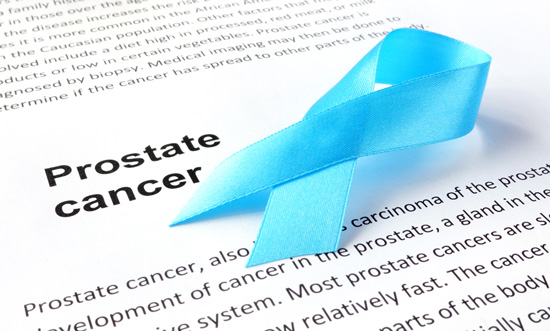About The Buzz: Fruit & Veggie Consumption Tied to Survival After Prostate Cancer?

WHAT THEY’RE SAYING
Men with prostate cancer who consume higher levels of fruits and veggies may live, on average, 15 years longer than peers with prostate cancer (PCa) who have lower fruit and veggie intake.
WHY THIS MATTERS
The prostate is a gland in the male reproductive system that is below the bladder and in front of the rectum.2 Roughly the size of a walnut, the prostate surrounds the urethra and produces the fluid that makes up part of the semen.2 As men age, the prostate may become larger, causing a potential blockage of urine and disrupting sexual function. The major risk factors for developing PCa are age, family history of prostate cancer, race and hormones.
In the United States, 12.9% of men will be diagnosed with PCa at some point during their lifetime. PCa is common in men 50 and older, and it is the second most common cancer among men.2,3 When PCa is found early and localized (contained) to the prostate, the survival rate is nearly 100% five (5) years after diagnosis. The survival rates have steadily increased in recent years, as the 5-year relative survival rate was only 66% in 1975.3
THE STUDY
It’s been hypothesized that there is a link between dietary and lifestyle factors and PCa survival rates, but the link between the two is unclear. In order to establish a better understanding of the protective effects of fruit and veggie consumption and prostate cancer, researchers in Italy collected data on a cohort of 777 men between the ages of 46-74 years of age. All men included in the study were diagnosed with PCa between 1995 and 2002, all of which had no previous history of cancer or previous cancer treatments. To verify the PCa diagnosis, a pathologist evaluated their medical records.
To assess lifestyle factors, participants completed a comprehensive questionnaire that included information on age, education, body composition measurements, lifestyle habits (physical activity, tobacco smoking, alcohol consumption, etc.), personal medical history and family history of cancer. Participants completed a food frequency questionnaire that assessed their typical diet two (2) years prior to PCa diagnosis. The food survey included questions on foods, beverages and recipes most common in the Italian diet and was structured into six sections: cereals, bread and first courses; second courses (meat, fish and other dishes); side dishes (vegetables); fruits; desserts, sweets and soft drinks; and finally, hot beverages, milk and sweeteners. The men were asked to indicate the average weekly frequency for each item. There were no dietary interventions or modifications in this study, the men simply reported their eating habits.
RESULTS OF THE STUDY
The average length of follow-up was 12.7 years for men in the study. By 2013, 263 (33.8%) participants had passed away; 81 (31%) were attributable to PCa and 182 (69%) to other causes. The average intake was 5.1 ounces/day for veggies and 8.7 ounces/day for fruit. Fruit and vegetable intake had a positive effect on overall survival after PCa diagnosis; the 15-year survival probability was 71% with high daily fruit and veggie consumption (>13 ounces/day or about 2-3 cups), as compared to 58% of those reporting lower fruit and veggie intake.
THE BOTTOM LINE
Consuming higher than average intake of either fruits or veggies alone did not increase survival probability, but it was the combination of both fruit and veggie intake that seemed to benefit PCa survivors most significantly in the long term. The researchers speculate that the high antioxidant content of fruits and veggies may increase post-cancer survival rates due to their impact on oxidative stress. This study serves as a baseline for better understanding the benefits that a diet high in fruit and vegetable intake may have on PCa survivors. Most importantly, this study demonstrates that it’s never too late to improve dietary habits that will enhance one’s health. Whether you’re aiming to lose weight or have been diagnosed with a chronic health condition such as diabetes, cardiovascular disease, cancer or another illness, consuming nutritious foods will improve your health and likely your quality of life as well.
OUR ADVICE
It’s never “too late” to take measures to improve your condition and strive for a healthier tomorrow. Check out these simple ways to include more fruits and veggies in your day.
- Know how much you need. Determine your personal fruit and veggie intake needs to create a healthy eating plan.
- Eat fruits and veggies at every meal. Fill Half Your Plate with Fruits & Veggies
- Go for what you know. Fill your cart with the fruits and veggies you like most, not the ones you feel obligated to eat or enjoy.
- But try new recipes, too! Set a goal of preparing a new recipe each week. This way, fruits and veggies that are new to you won’t go to waste.
- Stock up on veggies in your freezer and cabinet. Fresh, frozen, canned, dried, dehydrated, and 100% juice all count towards your daily fruit and veggie intake recommendation.
- Leave fruits and veggies within reach. Research shows the first foods seen are likely the first foods eaten.
- Be choosey about where you shop. Purchase your groceries at markets, farm stands, farmers markets, or try to shop the perimeter of the grocery store – all options will help you fill your cart with fewer processed items and more whole foods.
Video Center: Selection. Storage. Preparation.
How Many Cups Do You Need?
Key Nutrients in Fruits & Vegetables
Fruit & Veggie Database


